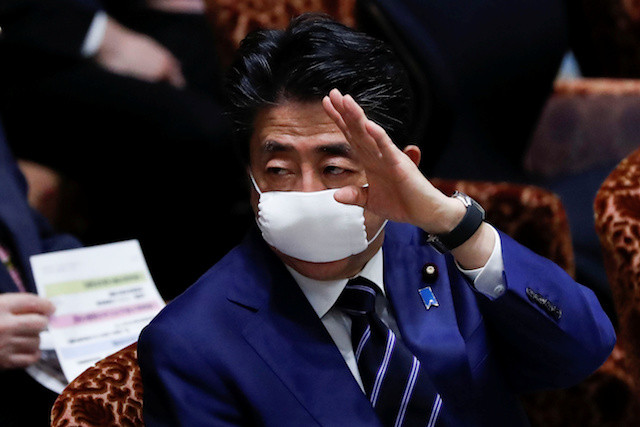Popular Reads
Top Results
Can't find what you're looking for?
View all search resultsPopular Reads
Top Results
Can't find what you're looking for?
View all search resultsJapan’s Shinzo Abe moves to declare state of emergency in Tokyo, Osaka
Change text size
Gift Premium Articles
to Anyone
J
apanese Prime Minister Shinzo Abe said he will propose declaring a month-long state of emergency in seven prefectures including Tokyo and Osaka, after a renewed surge of coronavirus cases in some of the nation’s biggest cities.
He also announced a much larger-than-expected stimulus package of 108 trillion yen ($988 billion) to support households and businesses struggling from the impact of the pandemic.
The declaration, which will also include Kanagawa, Saitama, Chiba, Hyogo and Fukuoka prefectures, will be made as soon as Tuesday, Abe said in Tokyo. The move hands powers to local governments to try to contain the spread of the virus that causes Covid-19, including by urging residents to stay at home.
Public transportation will continue to operate, Abe said, adding that the declaration will not lead to the kind of lockdown seen in some countries overseas. Unlike countries like France -- where residents can be fined for leaving their homes -- there is no legal power to enforce such requests.
The package of economic measures, set to be Japan’s biggest ever, surpassed the 60 trillion yen ($550 billion) recommended by Abe’s ruling party last week. Details of the package are expected to be announced Tuesday.
Japan to fight virus with two-stage stimulus plan
An emergency declaration enables local officials to take measures such as ordering the cancellation of events, restricting use of facilities such as schools and movie theaters and appropriating land or buildings for temporary medical facilities. The announcement comes after pressure from the public and the medical community.
After last week saying the situation didn’t yet call for such a move, Abe changed course after cases in Tokyo surged over the weekend.
As with many laws in Japan, there are no penalties associated with breaching instructions, except in the case of concealing supplies after the government orders them to be handed over. While much of the order will have no teeth, businesses are likely to further cooperate in closing shops and restaurants, while more residents are expected to stay indoors.
A state of emergency can stay in place for as long as two years and can be extended by as much as one more year, under a law updated in March. The prime minister can make the call when the spread of the infection threatens serious damage to the lives and health of the people, as well as to the economy.
The move also enables local governments to take steps such as:
*. Controlling prices of daily essentials
*. Providing loans through government-related financial institutions
*. Making compulsory purchases of food and medicines










